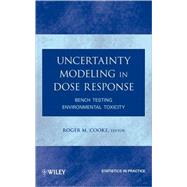
Note: Supplemental materials are not guaranteed with Rental or Used book purchases.
Purchase Benefits
What is included with this book?
ROGER M. COOKE, PhD, is Professor in the Department of Mathematics at Delft University of Technology, the Netherlands, and Chauncey Starr Senior Fellow for Risk Analysis at Resources for the Future, a nonprofit organization based in Washington, D.C., that conducts independent research on environmental, energy, and natural resource issues. Recognized as one of the world's leading authorities on mathematical modeling of risk and uncertainty, Dr. Cooke's research has widely influenced risk assessment methodology, particularly in the areas of expert judgment and uncertainty analysis.
| Acknowledgments | p. ix |
| Contributors | p. xi |
| Introduction | p. 1 |
| Analysis of Dose-Response Uncertainty Using Benchmark Dose Modeling | p. 17 |
| Comment: The Math/Stats Perspective on Chapter 1: Hard Problems Remain | p. 34 |
| Comment: EPI/TOX Perspective on Chapter 1: Re-formulating the Issues | p. 37 |
| Comment: Regulatory/Risk Perspective on Chapter 1: A Good Baseline | p. 42 |
| Comment: A Question Dangles | p. 44 |
| Comment: Statistical Test for Statistics-as-Usual Confidence Bands | p. 45 |
| Response to Comments | p. 47 |
| Uncertainty Quantification for Dose-Response Models Using Probabilistic Inversion with Isotonic Regression: Bench Test Results | p. 51 |
| Comment: Math/Stats Perspective on Chapter 2: Agreement and Disagreement | p. 82 |
| Comment: EPI/TOX Perspective on Chapter 2: What Data Sets Per se Say | p. 87 |
| Comment: Regulatory/Risk Perspective on Chapter 2: Substantial Advances Nourish Hope for Clarity? | p. 97 |
| Comment: A Weakness in the Approach? | p. 105 |
| Response to Comments | p. 107 |
| Uncertainty Modeling in Dose Response Using Nonparametric Bayes: Bench Test Results | p. 111 |
| Comment: Math/Stats Perspective on Chapter 3: Nonparametric Bayes | p. 147 |
| Comment: EPI/TOX View on Nonparametric Bayes: Dosing Precision | p. 150 |
| Comment: Regulator/Risk Perspective on Chapter 3: Failure to Communicate | p. 153 |
| Response to Comments | p. 160 |
| Quantifying Dose-Response Uncertainty Using Bayesian Model Averaging | p. 165 |
| Comment: Math/Stats Perspective on Chapter 4: Bayesian Model Averaging | p. 180 |
| Comment: EPI/TOX Perspective on Chapter 4: Use of Bayesian Model Averaging for Addressing Uncertainties in Cancer Dose-Response Modeling | p. 183 |
| Comment: Regulatory/Risk Perspective on Chapter 4: Model Averages, Model Amalgams, and Model Choice | p. 185 |
| Response to Comments | p. 194 |
| Combining Risks from Several Tumors Using Markov Chain Monte Carlo | p. 197 |
| Uncertainty in Dose Response from the Perspective of Microbial Risk | p. 207 |
| Conclusions | p. 217 |
| Author Index | p. 225 |
| Subject Index | p. 229 |
| Table of Contents provided by Ingram. All Rights Reserved. |
The New copy of this book will include any supplemental materials advertised. Please check the title of the book to determine if it should include any access cards, study guides, lab manuals, CDs, etc.
The Used, Rental and eBook copies of this book are not guaranteed to include any supplemental materials. Typically, only the book itself is included. This is true even if the title states it includes any access cards, study guides, lab manuals, CDs, etc.